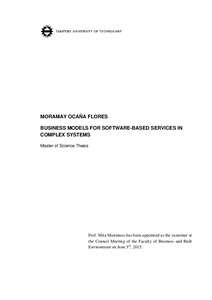Business models for software-based services in complex systems
Ocaña Flores, Moramay (2015)
Ocaña Flores, Moramay
2015
Master's Degree Programme in Business and Technology
Talouden ja rakentamisen tiedekunta - Faculty of Business and Built Environment
This publication is copyrighted. You may download, display and print it for Your own personal use. Commercial use is prohibited.
Hyväksymispäivämäärä
2015-09-09
Julkaisun pysyvä osoite on
https://urn.fi/URN:NBN:fi:tty-201508281554
https://urn.fi/URN:NBN:fi:tty-201508281554
Tiivistelmä
Manufacturing industry has evolved towards the delivery of complex systems, involving equipment, services and software components. Traditional industrial services are connected to the physical equipment, limiting the possibilities of service offering and thus, the financial benefits of them. It is not rare that services are focused on the maintenance of the customer’s equipment or on selling spare parts. Despite this, fiercer competition calls for new differentiation methods and increased customer value. Software-based services enabled by equipment lifecycle data represent a key business opportunity for manufacturing firms in a globalized world.
Previous studies on servitization in the manufacturing industry enabled by product lifecycle data have considered the software tools needed to deliver the services, but the conditions and network tasks in the delivery chain are often overlooked. In the manufacturing industry, the increased centrality of information technology calls for cooperation with more specialized suppliers, and this cooperation is poorly understood. Thus this thesis explores alternative business models for software-based services and the tasks related to the service delivery network, considering the cooperation between manufacturing and software firms. The conditions to enable and successfully promote industrial services based on equipment lifecycle data are also described.
An exploratory study was conducted with four software firms and two manufacturing companies. Interviews took place with employees with diverse managerial positions in different areas, revealing unexploited opportunities for software-based services enabled by equipment lifecycle data. A framework for a triadic cooperation is presented, clarifying the task division between manufacturing and software firms in service delivery. The customers’ participation specifics were set aside as this thesis had no access to them and their role specification was limited to the firms’ interpretation. It is suggested that a future study is conducted applying the presented suggestions and involving the customer in the process.
Previous studies on servitization in the manufacturing industry enabled by product lifecycle data have considered the software tools needed to deliver the services, but the conditions and network tasks in the delivery chain are often overlooked. In the manufacturing industry, the increased centrality of information technology calls for cooperation with more specialized suppliers, and this cooperation is poorly understood. Thus this thesis explores alternative business models for software-based services and the tasks related to the service delivery network, considering the cooperation between manufacturing and software firms. The conditions to enable and successfully promote industrial services based on equipment lifecycle data are also described.
An exploratory study was conducted with four software firms and two manufacturing companies. Interviews took place with employees with diverse managerial positions in different areas, revealing unexploited opportunities for software-based services enabled by equipment lifecycle data. A framework for a triadic cooperation is presented, clarifying the task division between manufacturing and software firms in service delivery. The customers’ participation specifics were set aside as this thesis had no access to them and their role specification was limited to the firms’ interpretation. It is suggested that a future study is conducted applying the presented suggestions and involving the customer in the process.
